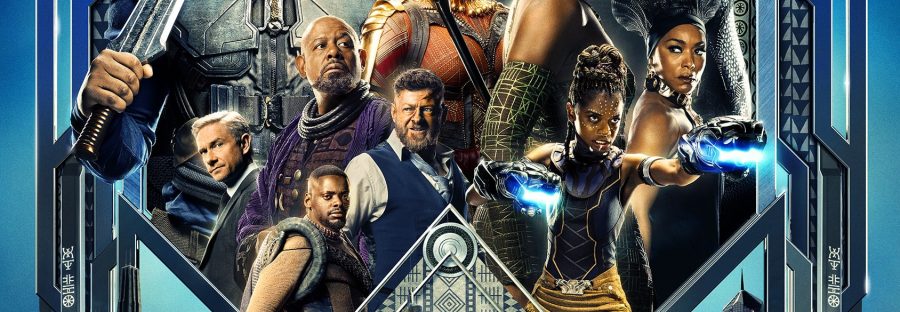Review: Black Panther
- Dir: Ryan Coogler
- Starring: Chadwick Boseman, Lupita Nyong’o, Michael B Jordan, Letitia Wright, Danai Gurira, Daniel Kaluuya, Martin Freeman, Andy Serkis.
- 12A cert, 134 mins.
It can be hard to keep up with the sheer amount of releases coming from the Marvel Cinematic Universe (MCU), with it feeling like we’re given a new one every month or so. However, we may well have seen 17 films released over the last decade, but none of which have come with the hype surrounding MCU’s 18th instalment Black Panther.
With the superhero genre being primarily white-fronted with your Bat-men, Spider-men and Super-men. Ryan Coogler’s 134-minute comic-blockbuster breaths a breath of fresh air into a somewhat saturated genre.
But don’t be mistaken Black Panther isn’t the first black comic book star to get his own film, go back 20 years and take a look at vampire-slaying Wesley Snipes in Blade. What it is however, is the first to attempt to bring “Afrofuturism”, a term coined in the 1990’s – combining sci-fi and African culture and traditions, into the mainstream.
The plot follows T’Challa’s (Chadwick Boseman) struggles once he is crowned as King following his father King T’Chaka’s death in Captain America: Civil War. He battles with himself ads to what’s best for his people’s culture and traditions and his own moral issues.
Costume designer Ruth E Carter and production designer Hannah Beachler’s creative visions make the film a visually stunning spectacle. It’s space-age meets tribesperson for the stunning warrior costumes in the fictional East Africa setting of ‘Wakanda’. Wakanda is spectacular and concealed technological metropolis in the middle of the African Savanna, powered as we find out in the opening scene of the film, by the precious metal ‘vibranium’ which crashed to earth in a meteorite.
Cutting to the next scene we’re in 1992, Oakland, California. Which introduces us to the Wakandan spy, Prince N’Jobu (Sterling K. Brown), radicalised into helping one of the films main antagonists, the cannon-armed Ulysses Klaue (Andy Serkis). Helping him secure vibranium. As well as being a key part of the plot, the Oakland setting – with its makeshift milk crate basketball nets and high-rise apartment blocks, makes stark contrast with the beauty of Wakanda.
For those familiar with the MCU’s movies Black Panther fills the hole between 2016’s Captain America: Civil War and the impending Avengers: Infinity War. But you don’t have to have seen the preceding 17 films before watching this one. Coogler does a fantastic job at bridging the gap between the two without barely referencing any of the earlier films making it feel like his work is a stand-alone piece in the ever-connected Marvel Universe.
Performance wise it’s hard to pick between Chadwick Boseman’s “King T’Challa” or villain Michael B. Jordan’s “Erik ‘Killmonger’ Stevens”. A nemesis whom gets his name from the sheer number of kills he’s racked up in the American military. The two come to heads at several points in the film and as the plot develops it’s hard not to sympathise with enemy as his anger becomes rationalised the more we learn about his past.
Despite the hype around Black Panther for me the film didn’t live up to it. Undoubtedly, it’s an incredible step forward in terms of cultural representation in the mass media and showcases a wide list of talent, including BAFTA winning actor Daniel Kaluuya. It does have big heart but on the whole it’s not the standout spectacular that was expected.


